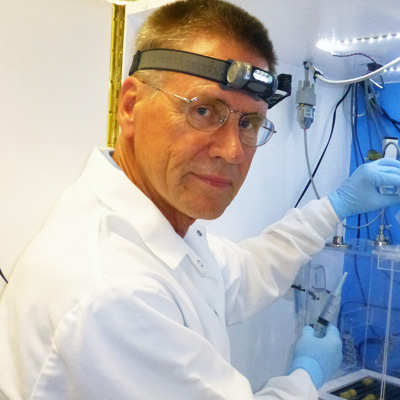Studying the brain mechanisms behind drug addiction and overconsumption of sweet, fatty food
According to the National Institutes of Health (NIH), in 2013, 16.5 million Americans reported heavy drinking of alcohol; 55.8 million were current cigarette smokers; and 24.6 million were current illicit drug users. Abuse of tobacco, alcohol, and illicit drugs exacts $700B annually in costs related to crime, lost work productivity, and healthcare. A closely related national health problem involves 4.2% of females who endure bulimia nervosa, while up to 5% of Americans experience binge eating disorder. Dr. Mark West, Professor of Psychology at Rutgers University, uses animal models to study the neural bases of cocaine addiction, for which there is no FDA-approved medication, and binge eating. Understanding the neural mechanisms and cognitive or emotional processes associated with these disorders could help identify both the changes in the brain resulting from addictive behaviors as well as therapies to help millions of affected individuals combat them. Treatment strategies are improving, and the goal of Dr. West’s research is continued improvement through better understanding of the underlying mechanisms.
Fortunately, scientific advances have revealed where brain mechanisms are likely to be found. Addictive psychological disorders involving substance abuse and binge eating are acquired because these activities trigger heightened dopamine release in the brain’s reward/motivation system. The natural and original functioning of dopamine in this system promotes survival by enabling organisms to learn behaviors that earn rewards such as water, food, or sexual stimulation. Rewarding particular behaviors via dopamine release onto neurons of this system enhances the motivation to repeat them, by helping the brain learn and remember where it found the reward. Such a system is built to change with experience via dopamine-mediated alterations that promote learning, which are under intense investigation. As drugs and binge eating over-stimulate dopamine’s actions, resulting in motivation to repeat those behaviors, identifying how the reward/motivation system operates and how it changes with over-stimulation will provide powerful insights into developing a treatment target.
To this end, Dr. Mark West and his team study animal models to understand the brain during behavior by recording activity at the level of the single neuron in these related areas of research:
- Drug Abuse and Cocaine Addiction: Drugs of abuse overstimulate dopamine transmission, especially in the developing brain of a teenager that is more susceptible to change. Dr. West and his team have found that neurons in the dopamine reward/motivation system acquire a response to drug cues, and also that activity of these neurons is directly related to drug level in the brain. The team hopes to further characterize these patterns so that they can become targets of medicines and behavior therapies.
- Opiate Addiction: In response to the ongoing opioid epidemic, he has teamed with another Rutgers researcher to study fentanyl self-administration in both laboratory animals and humans. They will test whether excessive avoidance behavior is a result of, or predisposes people to, chronic opioid self-medication.
- Binge Eating: Very similar to the action of an addictive drug, over-consumption of sweet, fatty foods also overstimulates dopamine transmission to a greater degree than a normal meal. Using the same single neuron recording methods used to study drug abuse and cocaine addiction, Dr. West and his team are studying the effects of a history of binge eating on the dopamine reward/motivation system, and how neural patterns of the system change in response to rapid overconsumption of high calorie food.
Bio
Dr. Mark West is Professor of Psychology at Rutgers University. He studies the behavioral correlations of dopamine to reward and addiction, which are as fascinating and as compelling as any in behavioral neuroscience. Adaptations within the brain’s dopamine system to stimuli that are crucial for survival (food, water, sex) are foundational to his research.
After he returned from serving in the Army in Vietnam, Dr. Mark West developed an obsession with doing something worthwhile with his life. Philosophy and literature courses in college left him longing for a scientific approach to understanding human behavior. Guided by the wisdom of an elderly friend, he set his sights on researching the brain and moved west to attend the University of California, Irvine, renowned for its brain research. The 1970’s were great years to be associated with psychobiology at Irvine, even as an undergraduate. Here, Dr. West learned how to use electrophysiology in animal models and studied memory functions of the hippocampus with Dr. Sam Deadwyler as his mentor.
He graduated with a B.S. in Biological Sciences and moved with Dr. Deadwyler to Wake Forest University School of Medicine where he earned a Ph.D. in Physiology. As a postdoctoral fellow at the University of Texas Southwestern Medical School in Dallas, Dr. West was introduced to the field of dopamine. Later in his first position at Rutgers University, Regina Carelli and he contributed early evidence of both somatotopic organization in rat basal ganglia, as well as neuronal plasticity in the dopamine system associated with learning.
Dr. West continues to conduct electrophysiological research on dopamine’s role in addiction. All the while, he has taught classroom courses to undergraduate and graduate students, and his research and teaching have fulfilled his every desire to make a difference. One of the many benefits of his research has been the privilege of collaborating with faculty and students who are “smarter than [he is].”
His life is completed by his family, i.e., his wife Carol and seven kids, with whom he takes trips to Lake Placid, Cape May, the Amish country in Pennsylvania, and Omaha to visit family. When they were first married, his wife took him on an unforgettable bike tour she had been leading for years, through Holland, Denmark and Austria.
Outside of research, Dr. West also enjoys reading, and some of his favorite books are The Next 100 Years by George Friedman and As I Lay Dying by William Faulkner.
For more information, visit his laboratory’s web site and donation pie chart
In the News
Rutgers News


